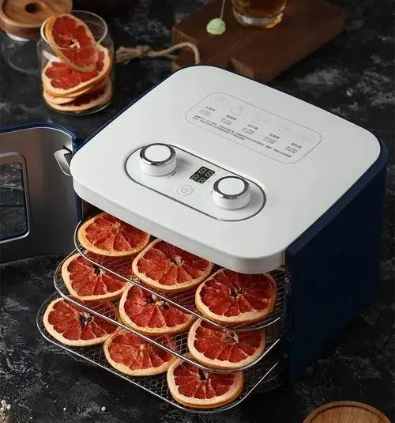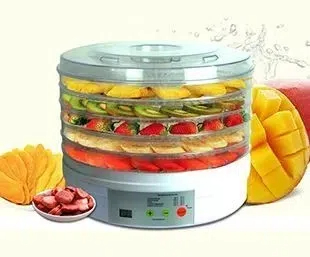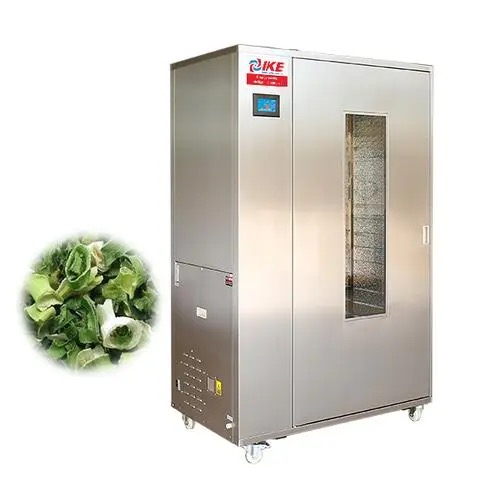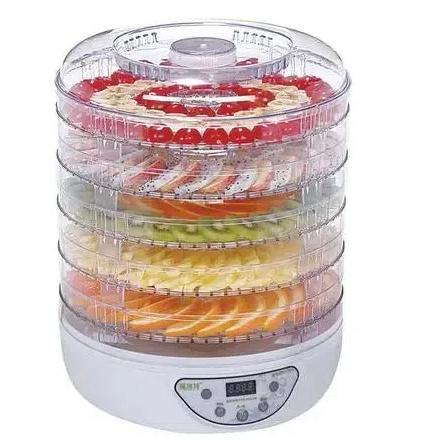
Content Menu
● Introduction
● Understanding Fruit Dryer Machines
>> Types of Fruit Dryer Machines
● The Dehydration Process
● Benefits of Using Fruit Dryer Machines
● Energy-Efficient Fruit Dryers
● Multi-Layer Fruit Drying Machines
>> Features of Multi-Layer Fruit Drying Machines
● Stainless Steel Food Dehydrators
● Automatic Fruit Drying Systems
● Applications of Fruit Dryer Machines
● Choosing the Right Fruit Dryer Machine
● Maintenance and Care
● The Future of Fruit Drying Technology
● Conclusion
● Frequently Asked Questions
>> 1. What are the main benefits of using a fruit dryer machine?
>> 2. How long does it take to dry fruits in a dehydrator?
>> 3. Are dried fruits as nutritious as fresh fruits?
>> 4. Can I use a fruit dryer machine for other foods?
>> 5. How do I choose the right fruit dryer machine for my needs?
Introduction
In today's fast-paced world, the demand for healthy, convenient, and long-lasting food options has never been higher. Enter the fruit dryer machine, a revolutionary piece of equipment that has transformed the way we preserve and enjoy fruits and vegetables. These innovative devices, also known as food dehydrators, have become increasingly popular among health-conscious consumers, food enthusiasts, and commercial producers alike. In this comprehensive guide, we'll explore the world of fruit dryer machines, their benefits, and how they're changing the landscape of food preservation.
Understanding Fruit Dryer Machines
Fruit dryer machines, or industrial fruit dehydrators, are specialized appliances designed to remove moisture from fruits and vegetables, extending their shelf life while preserving their nutritional value and flavor. These machines work by circulating warm air around the food items, gradually evaporating the water content and leaving behind concentrated, dried products.
Types of Fruit Dryer Machines
There are several types of fruit dryer machines available in the market, catering to different needs and scales of operation:
1. Home-use food dehydrators
2. Commercial food dehydrators
3. Industrial-scale fruit drying equipment
Each type offers unique features and capabilities, making them suitable for various applications, from small-scale home use to large-scale commercial production.

The Dehydration Process
The fruit drying process involves several key steps:
1. Preparation: Fruits are washed, peeled (if necessary), and sliced to ensure even drying.
2. Arrangement: The prepared fruits are arranged on trays or racks within the dryer.
3. Drying: Warm air is circulated through the machine, gradually removing moisture from the fruits.
4. Cooling: Once dried, the fruits are allowed to cool before packaging.
This dehydration process for fruits is carefully controlled to maintain the optimal balance between moisture removal and preservation of nutrients and flavor.
Benefits of Using Fruit Dryer Machines
The use of fruit dryer machines offers numerous advantages:
1. Extended shelf life: Dried fruits can last for months or even years when properly stored.
2. Nutrient retention: The gentle drying process preserves most of the fruits' vitamins and minerals.
3. Space-saving: Dried fruits take up less storage space compared to fresh produce.
4. Versatility: Dried fruits can be used in various recipes or enjoyed as healthy snacks.
5. Reduced waste: Dehydration allows for the preservation of surplus fruits that might otherwise spoil.
Energy-Efficient Fruit Dryers
Modern fruit dryer machines are designed with energy efficiency in mind. Many models feature advanced technologies that optimize power consumption while maintaining high performance. These energy-efficient fruit dryers not only reduce operational costs but also contribute to a more sustainable food production process.
Multi-Layer Fruit Drying Machines
One of the most popular designs in commercial and industrial settings is the multi-layer fruit drying machine. These devices feature multiple trays or racks, allowing for the simultaneous drying of large quantities of fruits. This design maximizes efficiency and output, making it ideal for commercial food dehydrator applications.
Features of Multi-Layer Fruit Drying Machines
1. Adjustable temperature controls
2. Timer functions
3. Even air circulation
4. Easy-to-clean trays
5. Transparent doors for monitoring
Stainless Steel Food Dehydrators
For those seeking durability and hygiene, stainless steel food dehydrators are an excellent choice. These machines offer superior resistance to corrosion and are easy to clean, making them ideal for both home and commercial use. The non-reactive nature of stainless steel also ensures that no unwanted flavors are imparted to the dried fruits.
Automatic Fruit Drying Systems
As technology advances, so do fruit dryer machines. Automatic fruit drying systems represent the cutting edge of food preservation technology. These sophisticated machines offer features such as:
1. Precise humidity control
2. Automated tray rotation
3. Smart sensors for optimal drying
4. Remote monitoring capabilities
5. Integration with other food processing equipment
These advanced features ensure consistent quality and maximize efficiency in large-scale operations.

Applications of Fruit Dryer Machines
Fruit dryer machines find applications across various industries and settings:
1. Home kitchens: For health-conscious individuals and cooking enthusiasts
2. Restaurants: To create unique dried fruit ingredients for dishes and garnishes
3. Food manufacturing: Large-scale production of dried fruits for retail
4. Agriculture: Preserving surplus harvest and adding value to farm produce
5. Herbal medicine: Drying medicinal herbs and plants
Choosing the Right Fruit Dryer Machine
When selecting a fruit dryer machine, consider the following factors:
1. Capacity: Determine the volume of fruits you plan to dry regularly
2. Energy efficiency: Look for models with good energy ratings
3. Temperature control: Ensure the machine offers precise temperature adjustments
4. Ease of use: Consider features like digital controls and easy-to-clean components
5. Durability: Opt for well-constructed machines, preferably with stainless steel components
6. Noise level: Some machines can be noisy, so consider this if it's a concern
7. Brand reputation: Choose reputable manufacturers known for quality and customer support
Maintenance and Care
To ensure the longevity and optimal performance of your fruit dryer machine, regular maintenance is essential:
1. Clean the trays and interior after each use
2. Check and clean air filters regularly
3. Inspect heating elements and fans for any signs of wear
4. Keep the machine in a dry, clean environment when not in use
5. Follow the manufacturer's guidelines for deep cleaning and servicing
The Future of Fruit Drying Technology
As we look to the future, fruit drying technology continues to evolve. Emerging trends include:
1. IoT-enabled smart dehydrators
2. Solar-powered fruit dryers for sustainable operations
3. Hybrid drying technologies combining different methods for optimal results
4. Artificial intelligence for precise control and predictive maintenance
5. Compact, high-efficiency models for urban farming and small spaces
These innovations promise to make fruit drying even more efficient, accessible, and sustainable in the years to come.
Conclusion
Fruit dryer machines have revolutionized the way we preserve and enjoy fruits and vegetables. From small home units to large industrial fruit dehydrators, these devices offer a myriad of benefits, including extended shelf life, nutrient retention, and versatility in food preparation. As technology continues to advance, we can expect even more innovative features and applications for fruit dryer machines, further cementing their place as essential tools in modern food preservation and processing.
Whether you're a health-conscious individual looking to make your own dried snacks, a chef experimenting with new ingredients, or a large-scale food producer seeking efficient preservation methods, fruit dryer machines offer a solution that combines tradition with cutting-edge technology. By harnessing the power of controlled dehydration, these machines not only help reduce food waste but also open up new possibilities for creating delicious, nutritious, and long-lasting food products.
As we move towards a future where sustainability and efficiency are paramount, fruit dryer machines stand as a testament to human ingenuity in food preservation. Their ability to transform perishable fruits into shelf-stable delights while maintaining nutritional integrity is nothing short of remarkable. With ongoing advancements in energy efficiency and automation, fruit dryer machines are set to play an even more significant role in shaping the future of food production and consumption.

Frequently Asked Questions
1. What are the main benefits of using a fruit dryer machine?
Answer: The main benefits include extended shelf life of fruits, preservation of nutrients, space-saving storage, versatility in food preparation, and reduction of food waste. Fruit dryer machines allow you to enjoy seasonal fruits year-round and create healthy snacks at home.
2. How long does it take to dry fruits in a dehydrator?
Answer: The drying time varies depending on the type of fruit, its water content, and the specific machine used. On average, it can take anywhere from 6 to 36 hours. Berries and thin-sliced fruits dry faster, while denser fruits like apples or pears may take longer.
3. Are dried fruits as nutritious as fresh fruits?
Answer: While some nutrients may be lost during the drying process, dried fruits retain most of their nutritional value. They are often more concentrated in calories and nutrients per weight compared to fresh fruits due to water removal. However, they should be consumed in moderation due to their higher sugar concentration.
4. Can I use a fruit dryer machine for other foods?
Answer: Yes, most fruit dryer machines are versatile and can be used for various foods. Besides fruits, you can dry vegetables, herbs, make jerky, dry flowers, and even make yogurt in some models. Always check your machine's manual for specific instructions on drying different types of food.
5. How do I choose the right fruit dryer machine for my needs?
Answer: Consider factors such as capacity (how much fruit you plan to dry at once), energy efficiency, temperature control options, ease of use, and durability. For home use, a smaller unit with 5-10 trays might suffice, while commercial needs may require larger, industrial-grade machines. Also, consider features like adjustable thermostats, timers, and the noise level of the machine.












